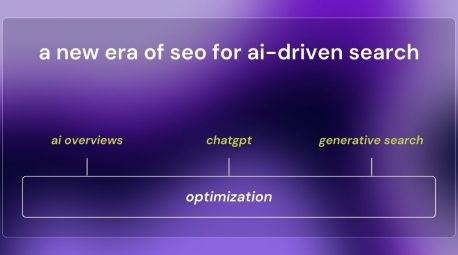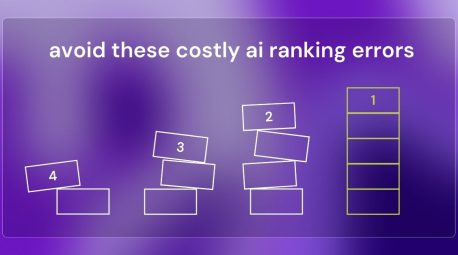How to Optimize for AI Overviews, ChatGPT, and Other Generative Search Engines

Traditional search results aren’t the only game in town anymore. If you’ve noticed AI-generated summaries, direct answers, or conversational search replacing the familiar “10 blue links,” you’re already witnessing the future of search in action. Platforms like Google AI Overviews, ChatGPT with browsing, and Perplexity AI are becoming gatekeepers to information — deciding which brands appear in answers and which ones disappear from the conversation.
Optimizing for these AI-driven experiences requires a different approach than traditional SEO. This guide will show you how to make sure AI doesn’t just understand your content, but actually cites and includes you in its responses.
Why AI-Driven Search Requires New Optimization Tactics
Search behavior has shifted dramatically. AI overviews and generative engines are trained to synthesize answers rather than serve long lists of links. That means your brand must be seen as a credible, structured, and relevant source before it even has a shot at being included.
Unlike traditional SEO — where ranking #3 still gets you clicks — AI results often feature only one to three cited sources. If you’re not in that tiny selection, you’re invisible. GEO (Generative Engine Optimization) focuses on positioning your brand so it’s chosen for that high-value real estate.
Key Strategies to Optimize for AI Overviews & Generative Search
1. Understand the Platforms You’re Targeting
Not all AI-driven platforms work the same way. Google AI Overviews might prioritize freshness and authority from its existing index, while ChatGPT’s browsing mode may rely more heavily on easily parseable facts and reputable citations. Perplexity, on the other hand, blends conversational AI with curated link sources.
Start by mapping out the platforms where your audience is most active. Run sample searches for your core topics and see which types of sources are being cited. This research gives you a baseline for what kind of content format, tone, and authority level these engines prefer.
2. AI Visibility Audits
You can’t improve what you can’t measure, and in the generative search landscape, measurement means identifying if and where you’re showing up in AI-generated answers. AI visibility audits are your compass for navigating this new territory.
Run queries for your target keywords in Google AI Overviews, ChatGPT, and Perplexity AI. Document whether your brand appears, what’s cited, and which competitors are showing up instead. Analyze the winning content — is it longer, more structured, more data-driven? Identify gaps in your own content and entity coverage, then plan updates accordingly. Over time, visibility audits let you measure improvement and directly tie your GEO efforts to results.
3. Structured Content for AI Parsing
Generative AI engines need content that’s easy to read — not just for humans, but for algorithms. Structured formatting helps AI quickly extract key facts, concepts, and entities, which increases your chances of being cited.
Break your content into logical H2 and H3 subtopics, each covering a single idea. Include FAQ sections with crisp, standalone answers to common questions in your niche. Supplement narrative paragraphs with tables, bullet lists, and step-by-step guides to offer multiple data formats AI can reference. By making your content “AI-friendly,” you’re also improving the experience for human readers.
4. Authority & Citation Building
In the world of AI search, authority is binary — you’re either considered a credible source or you’re ignored. Earning citations from AI engines requires building and maintaining a trustworthy reputation.
Publish original research, surveys, and proprietary data that others can’t easily replicate. Secure backlinks from reputable, niche-specific websites to strengthen both your human and AI authority signals. Maintain detailed author bios with verifiable credentials, so algorithms can confidently attribute expertise to your brand. Over time, consistent authority-building turns your site into a preferred reference point for AI-generated answers.
5. Keep Entities Consistent Across the Web
AI engines rely heavily on entity recognition to understand who you are, what you do, and how you’re relevant to a query. If your brand name, key facts, or product details are inconsistent online, you’re hurting your chances of being recognized as a trusted entity.
Audit your Google Business Profile, LinkedIn page, social profiles, and industry directories to ensure all details — from your name to your services — match exactly. Use structured data markup (schema.org) to tag entities on your website, making it easier for AI to connect the dots. Consistency builds trust with algorithms, just like it does with humans.
6. Monitor & Adapt to AI Algorithm Changes
Generative AI search engines are evolving at lightning speed. What works today might change tomorrow as platforms refine how they choose and cite sources. Staying ahead requires ongoing monitoring and a willingness to adapt.
Set a monthly or quarterly schedule for reviewing your visibility in AI platforms. Track shifts in citation patterns, content preferences, or formatting changes. When you notice changes, adjust your strategy — whether that means publishing fresher content, adding more structured elements, or targeting new query types.
Final Takeway
The rise of AI overviews and generative search isn’t a passing trend — it’s a fundamental shift in how people discover, evaluate, and choose solutions. By implementing AI visibility audits, structuring your content for parsing, and consistently building authority, you can secure your place inside AI-generated answers and keep your brand front and center in this new era of search.
If you’re ready to turn AI search into a competitive advantage, Sperling.ai can help you make it happen.
FAQs
- How is optimizing for AI Overviews different from traditional SEO?
Traditional SEO focuses on ranking in search results pages. AI optimization focuses on being cited inside AI-generated answers, which have fewer spots and higher competition. - Can I skip SEO and go straight to GEO for AI visibility?
It’s not recommended. A solid SEO foundation gives AI engines the authoritative, high-quality content they need to reference you. - Do AI search engines value backlinks the same way Google does?
Yes and no. Backlinks from reputable sources still help, but AI also weighs data originality, entity clarity, and structured formatting more heavily. - How often should I run AI visibility audits?
At least quarterly, though monthly audits are better if your industry moves quickly or AI platforms are releasing frequent updates. - Which AI platforms should I prioritize for optimization?
Start with Google AI Overviews, ChatGPT with browsing, and Perplexity AI, as they currently have the largest user base and strongest influence on discovery.

